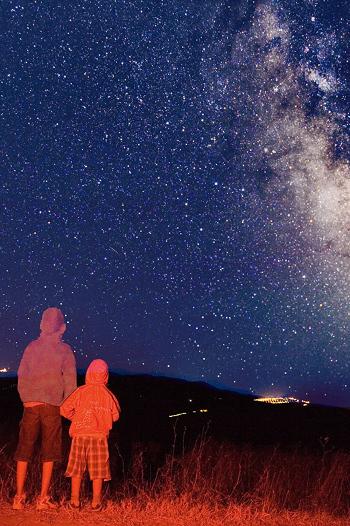Star light, star bright
Duration/age

Star light, star bright, the first star I see tonight...
As the sun starts to go down and night-time approaches talk to your child about what they might see and how the sky will change.
It is very bright and sunny while the sun is in the sky. What will happen when the sun sets?
When the sun disappears what appears instead?
Talk with your child about the difference between day time and night-time and what happens in the sky. Talk about the different colours you might see as the sun sets and the moon begins to rise. Do the stars appear before you see the moon? Do all of the stars appear in the sky at the same time?
I can see one tiny little star even though the sun has not quite set.
How many stars can you count in the sky? They weren’t there and all of a sudden they popped up.
Materials you will need
- The sky
- Night-time
- Your eyes
- Stars
Alternative tools
- Torch
- Telescope
Skills this activity improves
Why does this matter?
Stopping and looking at objects when you are out and about helps your child to develop observation skills and to develop the language to describe what they see. Talking about what they notice in the sky helps children to make sense of what they observe. It also helps them to organise the information into meaningful patterns.
Talking together about the night sky helps your child to ask questions. As they notice objects they can group them and compare the differences. As they talk about what they notice they are developing language to describe their thinking and observations.
Observing differences such as colour, shape, size and patterns helps children to classify objects into different groups. When children are able to group and sort objects it helps them to know what to do with it and how to use it.
When children begin to describe their thinking they have started to hypothesise. When they hypothesise they are beginning to connect what they see to past experiences and to use this information to make decisions, reflecting on why things have happened.
What does this lead to?
Talking about and exploring the natural and everyday environment with your child will help them to develop the skills to notice, take risks and ask questions.
Talking about what you see in the sky during the day compared to at night helps children to begin to classify objects by behaviour. Sorting objects or things into smaller groups will help your child to make decisions about how to interact with the objects. It will give them language to explain their thinking.
The grouping of objects creates information and data. The information helps to tell us what to do and how to act.
“It’s time to go to bed when the stars come out.”
Language to use
- Star, moon, sun, sky
- Day time, night-time, twilight
- Morning, afternoon
- Sunset, sunrise, dawn, dusk
- Single, cluster, group, spread
- Transition, movement, across
- High, low
- Bright, dim
- Next to, between, behind
Questions to use
- Can you see the stars if it is cloudy?
- Do the stars move across the sky?
- Why are some stars higher in the sky?
Useful tips
- You might also like to take a look at the activities Where did the sun go? and Night-time creatures.
- When looking at the sky remind your child not to look into the sun.
- Remember to talk to your child in your home language.
More ideas
- Borrow books and stories from your local library about night-time.
- Go online to see what the weather forecast will be for the night. Can you still see the stars if there are clouds?
- Look in the paper or online for the sunset and sunrise times for the next day.
Variation by age
Three to five year olds
- Set the alarm on the clock for different times. Check to see if there are more or less stars in the sky as the time changes.
- Make a chart of the time you see the first star in the sky each day.
Questions to ask
- If we didn’t have a clock how could we tell what time it was?
- Are there more stars early in the night or late at night?
Language to use
- Weather, clouds, sun, stars, moon
- More, less, same, different, equivalent, changed
- Time
- Number, counting, estimate
- Measurement


